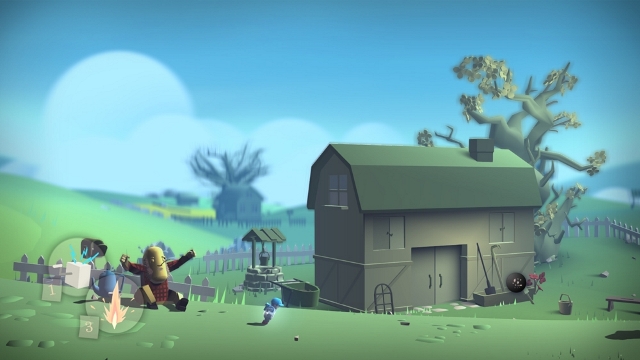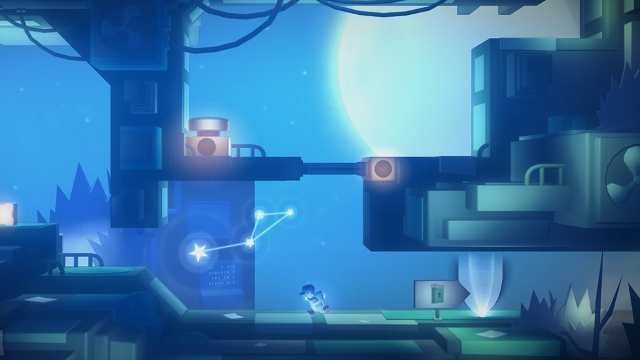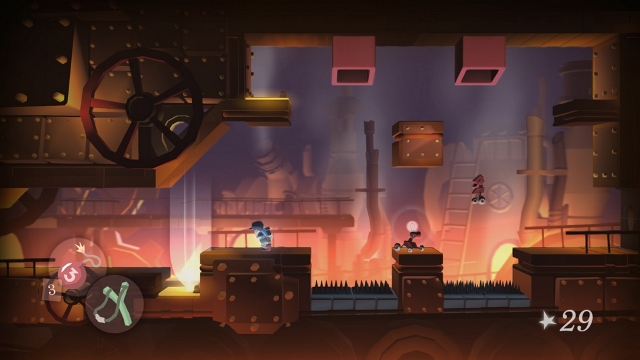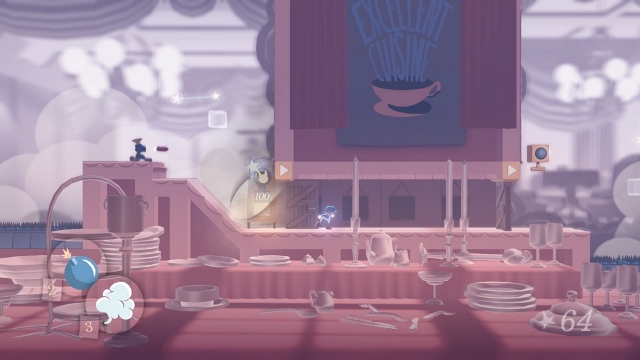Pid review (XBLA)
Pid was developed by Might and Delight and published by D3 Publisher. It was released on October 31, 2012 for 800 MSP. A copy was provided for review purposes.
Pid developer Might and Delight doesn’t much care for you. In fact, it’s entirely within the realm of possibility that the studio outright hates you. That may sound harsh, but how else can you explain the extreme lengths to which Might and Delight has gone to ensure death comes early and often for you in the developer’s new XBLA platformer?
Yes, creating a game in which modern visuals are intermingled with classic platforming charm and challenge was a premeditated act on Might and Delight’s part. And, yes, it’s a design philosophy that many developers of digital games have successfully adopted over the past several years. The team behind Pid, however, had its collective foot planted so heavily on the “player death” pedal throughout development,that the game’s surreal, charming atmosphere is an unrecognizable mess of roadkill by the time the gameplay finishes repeatedly mowing the player down hundreds of times. Pid’s world is an imaginatively oddball setting that beseeches the player to carry on and discover what lies on the other side of the next loading screen (more on that later), but it’s a world so fixated on presenting constant, frustrating challenges that no amount of audio-visual stimuli can convince one to keep on keepin’ on.
Here’s what we liked:
A dream world — If Might and Delight didn’t bring in an eight-year-old child as a consultant, it certainly did an admirable job of replicating the experience. The delightful visuals combine with a delightfully easy-going musical score to paint a world that’s as bizarre as it is wonderful. Its strangeness isn’t what you would call over-the-top or in-your-face weird, but the game world has a joyously eccentric allure to it that few adults would be capable of dreaming up on their own. Young protagonist Kurt slides effortlessly into this foreign setting without missing a beat. His puerile mind isn’t able to see the alien planet as strange or view the hostile environment as scary. He has a bus to catch, and most everything between him and it appears exactly as a young boy believes an adventure should. Thankfully, the player can experience and appreciate the world for what it truly is.
Clever puzzles — A few adventure game tropes — pressure tiles and “kill all the enemies in the room” — aside, Might and Delight’s effort is full of inventive puzzles that make the player think. Early on, Kurt gains the ability to place beams that levitate the player, items and enemies, and the developers have taken full advantage of this mechanic by creating puzzles requiring precise usage of the beams. In addition, a decent number of tools and items are introduced along the way to expand upon Kurt’s abilities, and they allow the developer to keep things fresh by regularly tossing new obstructions in front of the player. Sometimes no instructions or clues are given prior to new puzzle types being presented, making them initially obtuse. Enough tinkering, however, will result in plenty of epiphanies that make the player feel clever and eager to take on the next set of challenges.
Here’s what we didn’t like:
If he dies, he dies — After missing his space bus stop and being abandoned on a strange planet, Kurt wants nothing more than to get on the next working space bus offworld. Unfortunately for this lost little boy, a mysterious group with a never-ending supply of attack robots is hellbent on killing him before he can punch his ticket home. Most players are going to die several hundred times during the course of the game. The game demands nearly every maneuver players make be meticulously calculated and timed. Constant checkpoints help offset the frustration inspired by the draconian level of punishment that enemies, bosses and environmental hazards liberally dish out, but the normal difficulty setting is so merciless that most will feel little desire to make it across the finish line.
So much loading — Pid’s levels are sectioned off into small chunks sometimes no larger than a single room. A black loading screen lies in wait between each of these chunks, patiently waiting for the player to finally overcome the challenges before it so that it can diligently do its part to hold up progression. The wait for each load sequence only lasts a few seconds, but the loading screens are so ubiquitous that it really doesn’t matter how quickly each of them gives way to a new area.On top of that, players will also make regular trips to the loading screen courtesy of all the dying they’re going to be doing.
Broken pacing — Pid‘s inviting visuals, inventive bosses and clever puzzles would make for a good game were players allowed the chance to ever get into any sort of groove. Unfortunately the game begins at a snail’s pace and is never able to maintain the more exciting pace it begins to build towards after the first few hours of gameplay. The culprits are the aforementioned deluge of deaths and loading screens. What would otherwise be a fun encounter with an oversized living balloon aiming an elephantine revolver at the player becomes a frustrating exercise in repetition somewhere around the 15th time you’re hit by a stray bullet flying in from off-screen. What would be an entertaining series of rooms filled with interesting puzzles builds to a grueling slog as one loading screen after another stalls the experience.
Buried somewhere beneath Pid‘s many frustrations is a solid platformer fueled by plenty of good ideas, but Might and Delight’s game is unable to overcome the hurdles that slow it down and ultimately trip it up. Pid‘s charming appearance makes the player want to have fun in its playground, but its inability to establish any sort of gameplay rhythm makes it impossible to recommend purchasing. And yet, Pid‘s stronger qualities prevent an outright dismissal. Its world is worth giving a look, even though the broken pacing will inspire most gamers to walk away without seeing all it has to offer.
Score: Try It





